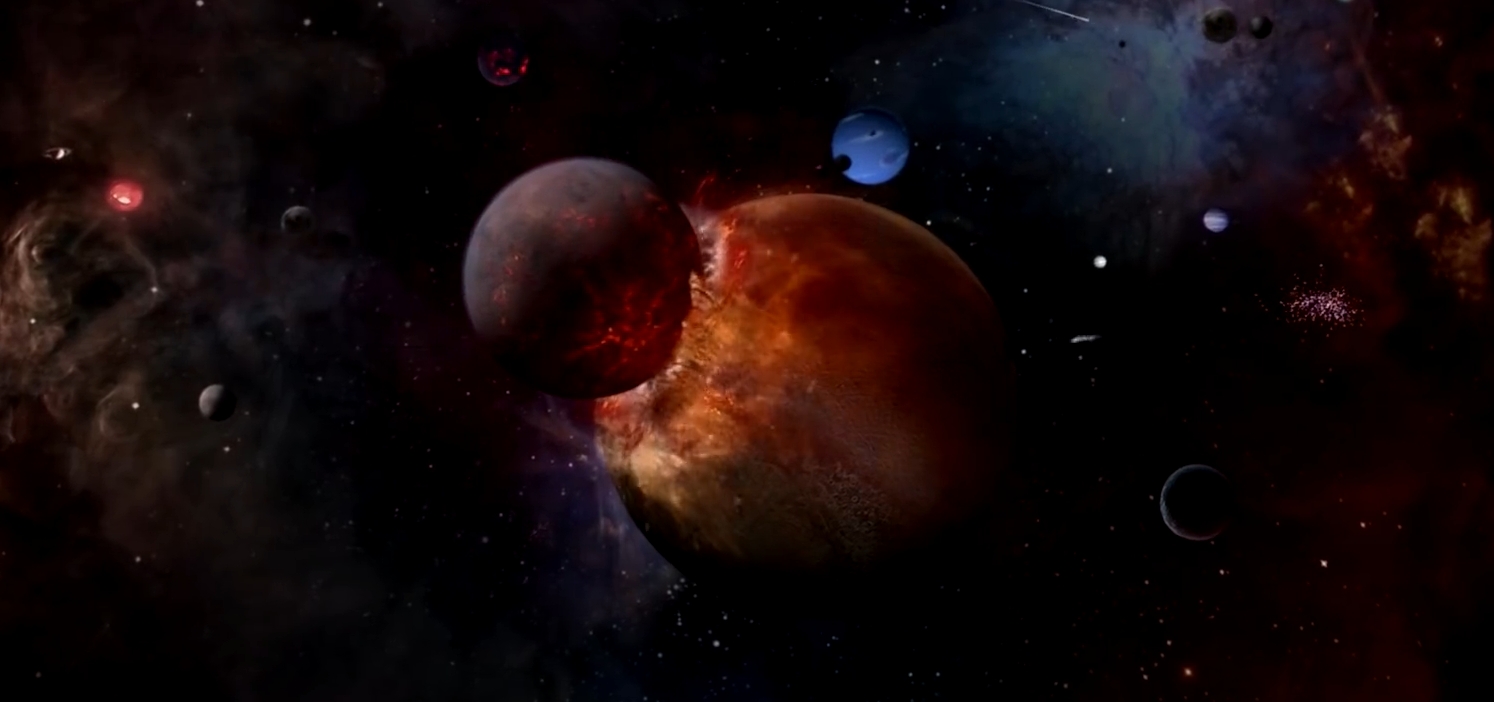

Theia,
Sent by God to Give Our Planet Earth its Finishing Touches.
The untold part of Genesis or how exactly did God do that.
by Will Wainwright
Have you ever thought about all the things that have to be “just right” for our earth to exist let alone be habitable for we human kind?
On the grand scale, there are the “fine tuning parameters” necessary for the existence of the universe itself. which also applies to the very small, the quantum world. Here too it is the precise interaction between subatomic particles such as quarks, leptons, neutrinos, muons, bosons etc etc. They all hold sway over how the very large exists. And finally, for life to exist, what about the intricacies of the DNA coding that makes us us, and which, many scientists now-a-days agree, that DNA could not evolve on its own.
Most of us believe Gods act of creation started with the big bang. This resulted in a universe of galaxies like our milky way, with black holes at their center, plus quasars and solar systems. And we may also know, God saw to it that the “local planetary conditions” of the earth’s place in our solar system were just right - “Goldilocks zone” as it is called, not too hot, nor not too cold, and this is where our story begins.
Ninety three million miles from the sun, let’s get down to earth and discuss its most obvious features. Earth rotates on its axis once in 24 hours giving us day and night. You might then look up and see our moon. Shortly, you’d happen upon our oceans, and notice tides and our seasons. What you may not notice is the life support she brought us, which we still depend on today. All of the aforementioned was made possible by a theorized visitor sent by God. Her name, Theia.
|
Allow me some license. During the early time of creation, during all the tumult
and mayhem, I can visualize God, from his vantage point grabbing a small planet
and hurling it towards our solar system, setting in motion the formation of our earth.
Theia was a Mars sized planet in our solar system. Once on passing Venus, it was so close to that it’s gravity reversed Venus’s rotation almost as if Venus stoped to look at Theia as she passed by. Continuing on, Theia found herself on a collision course with earth.
So now imagine a Mars size planet plowing into earth. Well it hit with such a force, traveling at 2 1/2 miles per second at a 45° angle, that chunks of earth went flying off into nearby space, coalesced and formed our moon. At the same time Earth was knocked off its axis 23.5° which kicked started our seasons. Theia was also theorized in bringing us our water which would eventually slosh back and forth between continents, pulled by the new moons gravity and causing our tides.
What part of Theia that didn’t fly off in the collision to make our moon buried deep into the magma of our planet increasing its mass and its magnetic field, which protects us from deadly gamma rays and solar flairs and coronal mass ejection. An lastly, our magnetic field encapsulates our atmosphere which would otherwise get blown away by the solar wind (as it has on Mars).
You probably did not knon that Theia was a Mars sized planet in our early solar system. (Theia is the Greek goddess of sight and by extension the goddess who endowed gold, silver and gems with their brilliance and intrinsic value.)
Theia is seldom mentioned in text books, as she only was named in year 2000, yet she made it possible for life to exist on earth. Yet, she is single handedly responsible for the four life supporting synergies mentioned above, which if any one were not to exist, we would not either. I forgot to mention, earth's day was 3 hours long prior to Theia’s collision eventually slowing us down to 24 hours. The name Theia was proposed initially by the English geochemist Alex N. Halliday and has become accepted in the scientific community. According to modern theories of planet formation, Theia was part of a population of Mars-sized bodies that existed in the Solar System 4.5 billion years ago. As for the actual impact hypothesis, that can be found here.